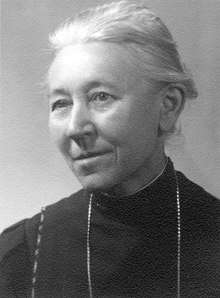Elisabeth Abegg
Luise Wilhelmine Elisabeth Abegg (German: [e.ˈliː.za.bɛt ˈaː.bɛk] (![]()
Elisabeth Abegg | |
|---|---|
 | |
| Born | Luise Wilhelmine Elisabeth Abegg 3 March 1882 |
| Died | 8 August 1974 (aged 92) |
| Alma mater | Leipzig University |
| Political party | German Democratic Party Social Democratic Party of Germany |
| Parents |
|
| Honours | Order of Merit of the Federal Republic of Germany Righteous Among the Nations |
Biography
Abegg was born in 1882 in Strasbourg, then a part of Germany, to Johann Friedrich Abegg, a jurist, and Marie Caroline Elisabeth (Rähm) Abegg. In 1912, she enrolled at Leipzig University, where she studied history, classical philology and Romance studies, and graduated with a doctorate in 1916.[1] She moved to Berlin in 1918 when the Alsace region was reclaimed by France. In Berlin, she became involved in postwar relief work organised by the Quaker community.[2] She became a teacher at the Luisengymnasium Berlin in Berlin-Mitte in 1924 and was an active member of the German Democratic Party.[1]
Abegg openly criticised the Nazi regime after Adolf Hitler assumed power in 1933. She was transferred to another school as punishment for her criticism[2] and was questioned by the Gestapo in 1938. In 1941, she was forced to retire from teaching and officially converted to Quakerism in 1941.[1] She began to help persecuted Jews find safe shelter in 1942.[3] She established an extensive network of rescuers—including her Quaker friends and her former students—to provide accommodation to Jews in hiding. Abegg temporarily housed dozens of Jews in her Tempelhof apartment, which she shared with her mother and disabled sister, and vacant neighbouring apartments, and secured permanent accommodation for them across Berlin, East Prussia and Alsace. She sold her jewelry to pay for some Jews' escape to Switzerland and tutored hiding Jewish children at her apartment.[2] In total, she sheltered around 80 Jews between 1942 and 1945.[3]
After the Second World War, Abegg resumed teaching in Berlin. She became a member of the Social Democratic Party of Germany and was active in Quaker groups.[1] In 1957, a group of Jews whom Abegg had rescued during the Holocaust published a book, titled And a Light Shined in the Darkness, in dedication to her.[2] She died in Berlin on 8 August, 1974.[4]
Honours and legacy
Abegg received the Order of Merit of the Federal Republic of Germany (Verdienstkreuz am Bande) in 1957. In 1967, she was recognised as Righteous Among the Nations by Yad Vashem.[5] A memorial plaque was mounted in her Tempelhof neighbourhood in 1991 and a street in Berlin's Mitte, Elisabeth-Abegg-Straße, was named after her in 2006.[1]
References
- "Elisabeth Abegg (geb. 1882 - gest. 1974)". Gedenkstätte Stille Helden (in German). Retrieved 9 December 2015.
- Haag, John (2002). "Abegg, Elisabeth (1882–1974)". Women in World History: A Biographical Encyclopedia. Retrieved 9 December 2015.
- "Elisabeth Abegg (1882–1974)". Berlin.de. Archived from the original on 4 March 2016. Retrieved 9 December 2015.
- Gailus, Manfred; Vollnhals, Clemens (2013). Mit Herz und Verstand: protestantische Frauen im Widerstand gegen die NS-Rassenpolitik (in German). V&R unipress GmbH. p. 78. ISBN 978-3-8471-0173-4.
- "Elisabeth Abegg". Yad Vashem. Retrieved 9 December 2015.
Sources
- Bernet, Claus (2006). Elisabeth Abegg. In: Biographisch-Bibliographisches Kirchenlexikon (BBKL). Vol. 26, Nordhausen: Bautz, ISBN 3-88309-354-8, Sp. 1–3
- Bender, Sara; Borut, Jakob; Fraenkel, Daniel; Gutman, Israel; eds. (2005). Lexikon der Gerechten unter den Völkern. Deutsche und Österreicher. Yad Vashem und Wallstein-Verlag, Göttingen, ISBN 978-3-89244-900-3
- Pereles, Liselotte (1984). Die Retterin in der Not. In: Kurt R. Grossmann: Die unbesungenen Helden. Menschen in Deutschlands dunklen Tagen. Berlin / Wien:Ullstein Verlag, ISBN 978-3-548-33040-2, pp. 85–93.